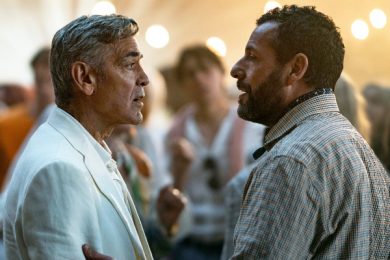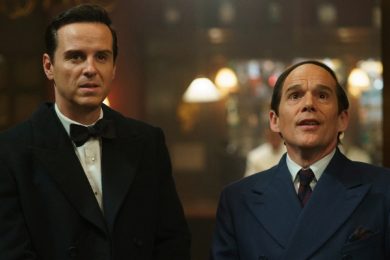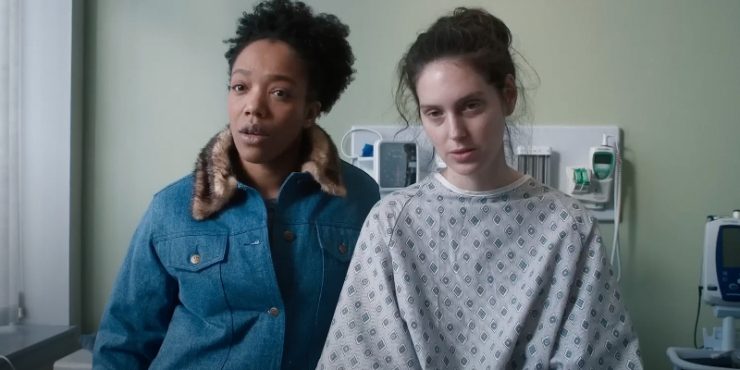Eva Victor’s Sorry, Baby takes place in a nonspecific setting nestled within New England academia, where each season seems touched by an autumnal chill. Jacket weather is all year round. There’s a sparseness to the streets, most people are inside their various homes and office buildings. It’s a place for bookish, introverted people, which makes it kind of the perfect setting for something terrible to happen. And yes, Victor’s script centers around a terrible thing, but the hook of Sorry, Baby, is just how uneventful Victor makes it out to be. In her directorial debut, Victor marries the traumatic with the quotidian, an examination of the ordinariness of trauma, and how that makes it that much more insidious.
Sorry, Baby premiered to rave reviews at Sundance. On its surface, and for much of the runtime of the movie, you may confuse it for any other nondescript Sundance indie, where trauma is a topic du jour. Sundance is perhaps the last of the major film festivals that truly does focus specifically on independent cinema. The tradeoff there is that most of the films will end up being about people sitting in rooms and talking to one another. The degree to which this is a bad thing varies from person to person. In the end, a good film tends to rise above whatever budgetary restrictions it has. Sorry, Baby certainly looks like a movie that was made for very little money, but Victor proves a deft filmmaker, with a sensitivity for performance and a confidence in narrative.
Victor plays the lead role of Agnes, a professor at the unnamed college where the film takes place. She lives alone in the same house she lived in as a grad student. In her student days, she lived in that house with Lydie (Naomi Ackie), who was in her same English program, and with whom she shared a tight, emotional bond. Lydie lives in upstate New York now with her wife, but tries to visit Agnes when she can. Lydie is the only friend who is aware that Agnes was sexually assaulted near the end of her tenure as a student, and she tries to be as present for her friend as she can, even as the responsibilities of her own life start to take major form.
Victor’s script is episodic, shifting back and forth in time. We get a sequence with Agnes and Lydie as students, dedicated to their theses and turning them into their professor, Mr. Decker (Louis Cancelmi). Decker recognizes Agnes’s talent, her brilliance with interpretation and language. He wants to encourage her mind and feed her talent. We know early on that Agnes is a survivor, so we know that Decker’s sensitivities will give way to predatory behavior. Victor leaves the “how” of it all in the air until the last possible moment. His indiscretion becomes her wound, one which seems unwilling to heal. The role of victim doesn’t come easy to Agnes who instead begins to wander emotionally, unable to make sense of why she was a target to begin with.
In other sections of the film, we see Agnes genuinely conflicted: what does justice look like for what she’s been through? Agnes says outright that she doesn’t want to see her attacker in prison, but she also doesn’t want to see him hurt another woman. This paradox (which only exists because society neglects the nuance these situations can sometimes have) prevents her from taking the usual steps toward seeking retribution. When the situation ends with her getting a job as a professor, she hopes this will allow her to move on, but things are much more complicated than that. The film is clever in how it presents Agnes’s conundrums, mostly through conversations with others, including a courtroom prosecutor (Hettienne Park), a friendly neighbor (Lucas Hedges), and a gruff sandwich salesman (a terrific one-scene performance from the great John Carroll Lynch).
Like a lot of Sundance movies, Sorry, Baby feels more like a proof of concept of a great filmmaker than it does an individually great movie. This is usually how it goes with these kinds of talky, low budget films. Victor finds small windows to make it as cinematic as it can be. A recurring sequence involving the window of Agnes’s bedroom window creates an incredibly effective visual metaphor. As a performer, Victor utilizes a very direct delivery to find humor in some incredibly dark moments. It’s kind of a miracle that some of these jokes work as well as they do here, but this is a genuinely funny movie, even if “comedy” is not the word I’d use to describe it.
A scene at the end gives Victor’s character (and her performance) some closure, and gives us some significance behind the film’s title. It’s a scene of anguish that’s delicately touched with an angle of hope. The balance is tenuous, but it succeeds on the strength of the acting and Victor’s writing. Sorry, Baby understands that our existence is often touched with tragedy, especially for women, who must confront a world that is hostile to their success, if not their very existence. Not everything in Victor’s film works perfectly, but that final scene certainly does, giving us some much needed uplift after seeing everything that Agnes has gone through. She may be rooted in the same place, but the world still moves around her; and that is enough reason to feel happy.
.
Written and Directed by Eva Victor










